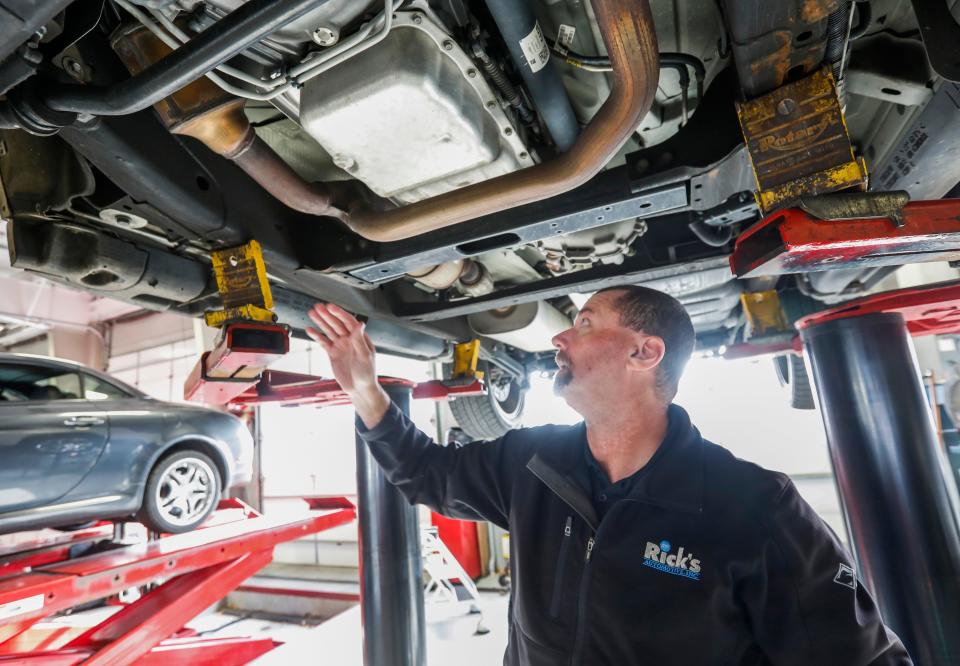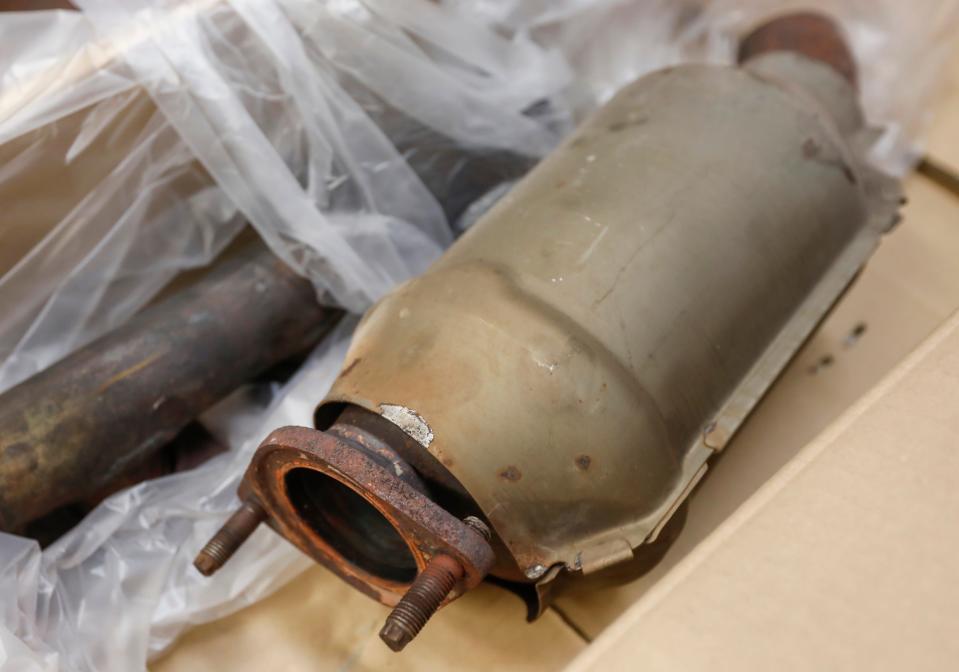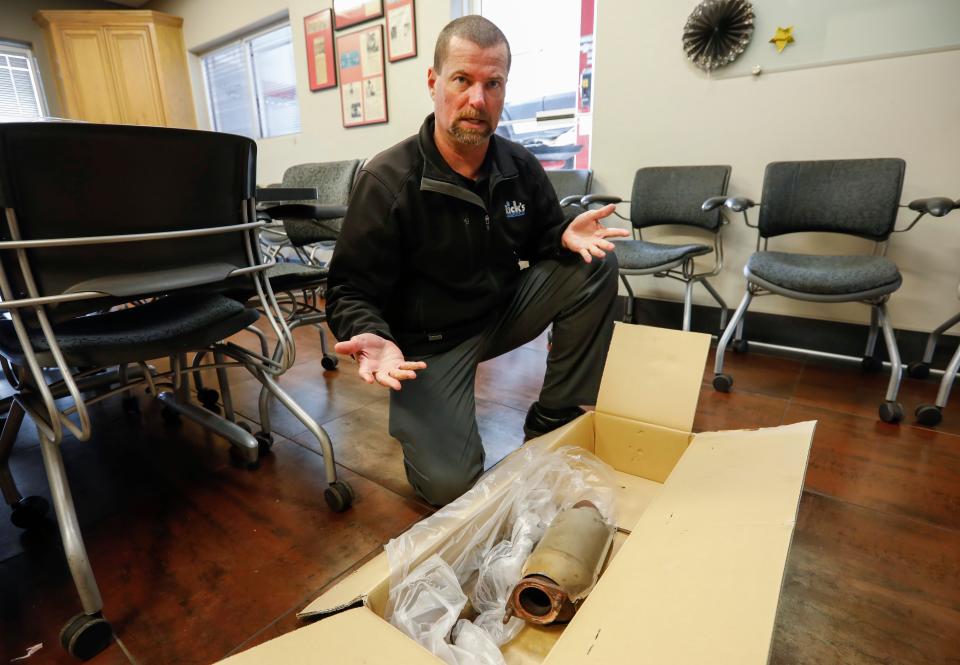Missouri lawmakers propose bills cracking down on catalytic converter theft
Few things make someone’s heart sink like discovering that their vehicle has been vandalized.
From busted windows to stolen catalytic converters, victims often have no recourse for justice in the matter, as catching the crooks who commit these kinds of crimes is often difficult.
However, Missouri lawmakers have proposed legislation to levy stiffer penalties for catalytic converter thefts and make selling or scrapping the detached part less convenient.
Catalytic converter theft has been the subject of some debate in the Missouri General Assembly for a few years. In fact, the House passed this exact legislation last year but, like many other bills, it died when the Missouri Senate devolved into infighting in the final weeks of the 2023 legislative session.

Reps. Don Mayhew, R-Crocker, and Hardy Billington, R-Poplar Bluff, have each proposed legislation to address the issue, although the bills differ a bit. Both bills were heard by the House Emerging Issues Committee on Wednesday.
Two Democratic Representatives, David Tyson Smith, D-Columbia, and Aaron Crossley, D-Independence, have also proposed bills aiming to tighten regulations for selling detached catalytic converters and increasing the penalties for dealing in stolen parts. Neither bill has yet been assigned to a committee.
Mayhew’s version, House Bill 2066, would charge those who steal catalytic converters with a Class E felony, while also requiring that buyers or sellers of detached catalytic converters have a salvage license through the Missouri Department of Revenue.
Additionally, scrap metal dealers must require proof that sellers of catalytic converters obtained them lawfully. Those that still accept stolen parts could lose their business license or also face a Class E felony.
“Catalytic converter theft is a problem in the state,” Mayhew said. “It has backed off slightly, but it is still a problem.”
In Springfield, occurrences of catalytic converter theft have fallen drastically from their 2021 peak, with 1,104 stolen that year. In early 2022, police brought down a $6 million catalytic converter theft ring in the city. Since then, the Springfield Police Department reported 226 stolen in 2022 and only 29 stolen in 2023.
However, Mayhew said that many in his rural district simply don’t report the theft anymore, after others have been told there’s little that can be done about it.
“They get a catalytic converter stolen and they know that calling the sheriff's department is going to result in, ‘Yeah, well we'll keep an eye out for it,’ kind of a thing so they wouldn't be bothered,” Mayhew said. “The biggest problem we find especially in rural areas is that most of these catalytic converters are stolen off of vehicles that have liability coverage only.”

Missouri State Highway Patrol Corporal Nate Bradley spoke at the hearing, attesting to the widespread nature of the problem. Bradley is a vehicle crime investigator who works mostly in the Kansas City area.
“In 2022, there were 30,875 vehicles reported stolen. In the last two years, I've personally recovered 624 stolen vehicles, most of which were missing the catalytic converters when I found them,” Bradley said. “Clearly we have a problem.”
Billington’s legislation, House Bill 1406, is targeted solely at the sale of catalytic converters. Any such parts must include on the bill of sale the Vehicle Identification Number, or VIN, from the vehicle the catalytic converter was removed from.
Brandon Koch, executive director of the Missouri Insurance Coalition, spoke in favor of both bills.
“Catalytic converter thefts are a big problem in the insurance industry, while we have seen some positive trend where that does appear to be going down,” Koch said. “Hopefully that's part of prior legislation. Hopefully that's part of just the fact that the value of the minerals that are within catalytic converters, that price has gone down.”

The current national average price for a catalytic converter is about $75. Madeleine Roberts of MOST Policy Initiative, a nonprofit that connects scientific research with state policy, spoke on both bills for informational purposes, providing further insight into the parts market values.
“Recyclers will typically pay $50 to $250 for each catalytic converter, and catalytic converters can be sold on the black market for up to $1,000,” Roberts said. “A replacement catalytic converter can cost the owner $1,000 to $4,000, which is typically covered by a driver's comprehensive insurance coverage.”
More: Motorists won't be seeing these vanity plates in Missouri in 2024
Billington feels that the fluctuating price of metal makes his bill well suited to confront the problem.
“The price of the metal is really the key,” Billington said. “Unfortunately, the chance the metal (prices) are going up is very good. Ensuring that each catalytic converter can be identified and traced to the vehicle can crack down on theft.”
Trent Ford, a registered lobbyist for the Institute of Scrap Recycling Industries, opposed Mayhew’s legislation because it groups together multiple entities that could receive detached catalytic converters and fails to require that those merchants operate at a fixed location.
He feels that many dealers buying stolen parts are likely to put out Facebook or Craigslist advertisements to sell the detached catalytic converters at a one-time location, then they vanish after the cash transactions are completed.
“This happens all the time. They just collect and they just give them cash, and that's how some of these things go,” Ford said. “Or when you know that’s going to happen at Walmart, to be there at 9:15 Tuesday night, you go get a catalytic converter to sell which is as bad.”

Shannon Cooper, a registered lobbyist for Advantage Metals Recycling, also opposed Mayhew’s bill, stating that it would create greater difficulties for scrap metal recyclers who were already doing things by the book.
“This bill is nothing but a ton of red tape and over-regulation of honest businesses across the state of Missouri that are doing the right thing, who are getting punished by folks who are doing the wrong thing,” Cooper said. “The people stealing these converters, they’re not our customers.”
Cooper proposed an alternative to solve the catalytic converter theft issue.
“Why don't we just write a one page substitute and say, ‘It shall be illegal for anyone in the state of Missouri to purchase a detached catalytic converter,” Cooper said. “Problem solved. We won't buy any more detached catalytic converters. Nobody in this state can buy them. And if you believe that legislation is gonna make bad people do good things, then there should never be another converter stolen.”
Neither Cooper nor Ford opposed Billington’s legislation, with both lobbyists speaking for informational purposes only. Cooper pointed out that matching the VIN number to a specific catalytic converter may prove difficult, advocating instead for the VIN numbers to be engraved directly onto the part.
Bradley, the Missouri State Highway Patrol corporal, said the efforts of scrap metal industries opposing this legislation are self-serving and not in the best interest of Missourians.
“The scrap industry has capitalized significantly on the purchase of catalytic converters. Citizens who have been affected by the theft of catalytic converters want one thing — accountability,” Bradley said. “To learn an industry has profited from their loss, and has also been arguing against any meaningful changes would likely frustrate the average person.”
This article originally appeared on Springfield News-Leader: Missouri lawmakers hope to crack down on catalytic converter theft

